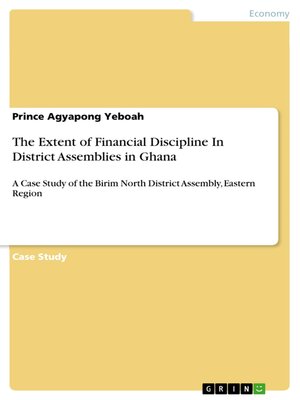The Extent of Financial Discipline In District Assemblies in Ghana
ebook ∣ A Case Study of the Birim North District Assembly, Eastern Region
By Prince Agyapong Yeboah

Sign up to save your library
With an OverDrive account, you can save your favorite libraries for at-a-glance information about availability. Find out more about OverDrive accounts.
Find this title in Libby, the library reading app by OverDrive.



Search for a digital library with this title
Title found at these libraries:
| Library Name | Distance |
|---|---|
| Loading... |
Case Study from the year 2014 in the subject Business economics - Economic Policy, Kwame Nkrumah University of Science and Technology (UNIVERSITY), course: BUSINESS ADMINISTRATION, language: English, abstract: Decentralization is a mechanism for bringing governance closer to the governed and helps to improve public administration by empowering local authorities, thereby enhancing the capacity of government to achieve local participation and accelerated development through financial sanity. Section 240(2) (c) of the Local Government Act of Ghana provides that each district assembly shall have a sound financial base with adequate and reliable sources of revenue, hence making them financially accountable to the people they serve. Despite this requirement, many Metropolitan/Municipal/District Assemblies have a limited number of sources of revenue for carrying out their activities. Apart from the District Assemblies Common Fund (DACF), which is 7% of total national tax revenue, the assemblies can also receive grants, land rates, mineral royalties, transfer, ceded revenues and external credits. The use of these monies is expected to conform to the Ministry of Finance and Economic Planning requirements. It is a requirement that, all monies are released at the assembly level by a warrant. This research examined the extent to which financial discipline was concerned within the Birim North District Assembly. It was found that not all monies paid were on the authority of the warrant. They are also expected to engage in activities that can generate revenues, (Internally Generated Fund, IGF) to be used for their administrative and other recurrent operations. However, many of them lack the capacity to develop revenue generating activities while others are unable to generate sufficient revenue internally because of the deprived circumstance of their districts. The researcher also found out that there were a lot of loopholes in the management of finances in the Local Government Service if the case of the Birim North District Assembly is anything to go by, only by the assumption that, this accession is not a hasty generalization. This research envisages providing baseline contribution to sound financial management within the district assemblies of Ghana.







